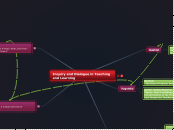Inquiry and Dialogue in Teaching and Learning
Bakhtin
Fecho: "Feasts of Becoming:
Imagining a Literacy Classroom Based on Dialogic Beliefs"
Vygotsky
Warford:
"The Zone of Teacher Development"
Clarke: "Action Research, Pedagogy, and Activity Theory: Tools Facilitating Two Instructors’
Interpretations of the Professional Development of Four Preservice Teachers"
Transition to Teacher Inquiry
Problem Posing
Essential Question
Investigation
Classroom Application
Presentation
Dewey
Wilhelm: "Inquiring Minds Learn to Read, Write, and Think: Reaching All Learners through Inquiry"
Freire
Perry: "What is Literacy? – A Critical Overview of Sociocultural Perspectives"
Dialogue
Teacher
With Self
With Other Teachers
Putnam: "What Do New Views of Knowledge and Thinking Have to Say about Research on Teacher Learning?"
Student
With Others
With Self and Text
Steenson: "Learning Logs in the Science Classroom: The Literacy Advantage"
Inquiry
Why Inquiry
Teacher's Role
Critical Lens
Delpit:
"The Silenced Dialogue:
Power and Pedagogy in Educating Other People's Children"
Gee:
"Literacy, Discourse, and Linguistics: Introduction"
Simmons:
"Class on Fire:
Using the Hunger Games Trilogy
to Encourage Social Action"
